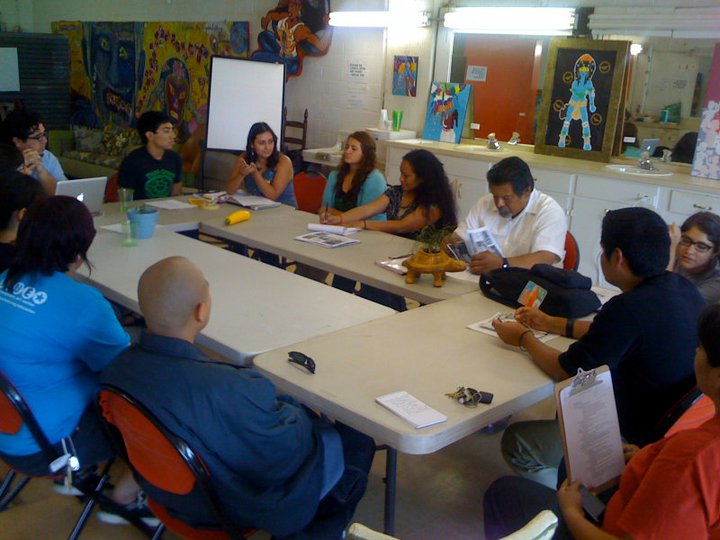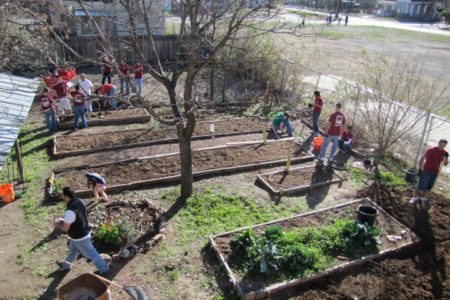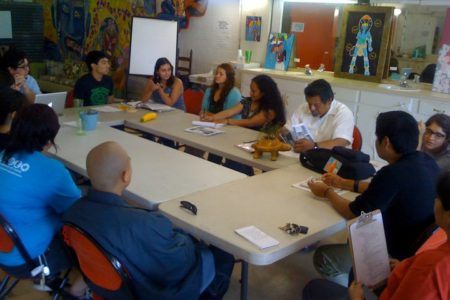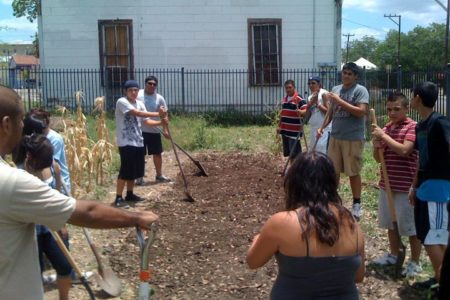
Share On Social!
When Latino kids choose to eat more fresh fruits and vegetables and less soda and chips, they set a good example for friends and family. But what if they can’t maintain their healthy lifestyle at school? Read what happens when youth leaders work with their school board to get healthy, vegan and vegetarian-approved lunch items into their cafeteria, not only to satisfy their desire to eat healthy but to empower other students to make healthier choices.
EMERGENCE
Awareness/Learn: For Sandra Garcia, it took planting a garden to realize just how powerful healthy food can be, not only for a community, but for a culture.

“When SWU [Southwest Workers’ Union] started the Roots of Change Garden in 2007, I realized how beautiful it was to grow your own naturally organic food,” said Garcia, the coordinator for the SWU’s youth program, the Youth Leadership Organization (YLO).
The SWU, based in majority-Latino San Antonio, unites low-income workers and families, community residents, and youth in one organizational effort for worker rights, environmental justice and community empowerment.
They planted the Roots of Change Garden as a response to a city decision to put more fuel storage tanks in the SWU’s eastside San Antonio neighborhood. But besides adding something positive to the community, the garden helped Garcia realize that the Hispanic cultural foods didn’t have to be unhealthy.
“I realized that our traditional diet and our traditional way of eating is actually healthy – filled with fruits, vegetables and herbs,” she said.
The youth she mentors began eating healthier too, many choosing to become vegetarians and vegans.
This awareness spurred Garcia to get the youth involved in getting healthier food options at school. 32% of Hispanic high school students in San Antonio are obese or overweight.
Learn: Students involved in YLO tend to go to schools in neighborhoods where healthy food is scare while junk food is plentiful.
In 2012, Garcia said she and the students tried to get a farm-to-school program going at a local school, Edison High School, but it proved way more difficult than they imagined.
“It was too much too soon,” Garcia said.
Still wanting to do something healthy-food related at the school, they started a garden and began learning about composting, even building their own composting pile.
While all this was going on, Garcia began to notice something. Many YLO students were really hungry after school and started asking her to bring them snacks. When she questioned them about what they were eating at lunch, she began to see what was going on.
Many of the vegetarian and vegan youth were barely eating lunch at school because there were no suitable options.
They told her the fresh fruit was usually rotten and any other fruit was often in syrup. There was no wheat bread available and the bread that was available was made with egg, something vegans don’t eat.
“You just can’t trust anything on the tray,” Garcia said.

Frame Issue: Meanwhile, then-sophomore Edison student Ivan Bermejo was convinced by his friends to attend a YLO meeting.
“Going into my first meeting was pretty nerve racking” but he jumped right in, Bermejo said.
“You could tell he was going to be a good leader,” Garcia said.
Bermejo could relate to the other health-conscious youth when it came to poor options at lunch. He was also a vegan and was getting headaches from not eating during the day.
“School food should be nutritious as well as appetizing to us, to encourage a healthier diet since we might not get one at home,” Bermejo said.
So Sandra and the youth began brainstorming how they could get healthier, vegan and vegetarian-friendly food options into the cafeteria.
DEVELOPMENT
Education/Mobilization: The group decided the best way to voice their school food concerns was to attend a school board meeting.
“The community needs to be heard….especially if it’s students coming to you about food at their school,” Garcia said.
A handful of YLO members began attending school board meetings and would individually sign up to speak. Students spoke about how having healthier options at lunch would really benefit student wellbeing and academic performance.
Bermejo had mixed feelings about speaking to the school board. He said he felt that sometimes they were listening but that it didn’t seem like they would really help the students get what they wanted, and some weren’t especially interested in helping low-income minorities, which was frustrating.
Garcia suggested they target individual board members outside of the meeting.
Bermejo and an older member of YLO, Sebastian, were tasked with interviewing school board members to see if they would be on-board with revamping school lunch.
“We started calling them one on one to see if they would meet with us,” Garcia said.
They got only one bite—Patti Radle.
Radle, a former city councilwoman, bilingual elementary school teacher and current volunteer co-director of Inner City Development, sits on countless non-profit boards and knows how to get things done.
Garcia took Bermejo and Sebastian to meet with Radle to make a case for better school lunches.
“We discussed details about some of the major components about the campaign as well as
what direction can we take,” Bermejo said.
Debate: Radle had two sit-down meetings with the students, helping them figure out how they would continue to advocate for better school food.
She urged the students to compliment the school board’s achievements.
“Like, ‘thank you for something else going on at school but we would also like to see this,’” Garcia said.
Sebastian had the idea to thank the school district for new school uniforms and a new running track.
Tweaking their approach in this way allowed Radle to speak to the board on behalf of the students, and she began doing what she could to advocate for better food for the Edison cafeteria.
ENACTMENT
Activation/Frame Policy: While Radle was working on the school board, Bermejo and the YLO were continuing the gain more support.
“I felt the turning point was the amount of support we received from local families as well the students who willingly took the surveys and signed our petitions,” he said.
Change: About a week after the YLO’s last meeting with Radle, Garcia emailed the highlights of SAISD’s approved menu changes for Edison, including::
• Switching from white rice to brown rice
• Switching from white bread to wheat bread
• Adding vegan-friendly sides like mashed potatoes or greens
• Offering pre-prepared salad every day (without cheese)
• Offering an Asian-inspired menu at least once a month
The era of skipping school lunch was over for health and environmentally-conscious students at Edison.
“Overall I felt we did a good thing” and classmates were supportive, Bermejo said.
IMPLEMENTATION

Implementation/Equity: Simple changes like keeping the rice separate from the meat allows students to make the dietary choice that’s right for them, Garcia said.
She is happy the students she works with are able to get the food they need to stay and healthy and be successful in school.
Sustainability: Garcia continues to educate YLO members about healthy eating and how money, upbringing and the food industry all play a role. They are still working to get a farm-to-school program up and running at Edison.
Currently, Garcia is a Healthy Communities Fellow with the Funders’ Collaborative on Youth Organizing (FCYO) Healthy Communities II initiative. In this role, she’s supporting FCYO’s local work in San Antonio and connecting it to state and national strategies for change, including community education and engagement and policy development and implementation.
As for Bermejo, he’s in college now, but still keeps up with SWU and is proud of his time at Edison. He advises any would-be advocate to not let feeling small get in the way of making your community a better place.
“At times it may seem that everything is so much bigger and stronger than you and that you can’t possible fix this, but realize that you are not alone, there are people that are more than willing to help,” he said.
This success story was produced by Salud America! with support from the Robert Wood Johnson Foundation. The stories are intended for educational and informative purposes. References to specific policymakers, individuals, schools, policies, or companies have been included solely to advance these purposes and do not constitute an endorsement, sponsorship, or recommendation. Stories are based on and told by real community members and are the opinions and views of the individuals whose stories are told. Organization and activities described were not supported by Salud America! or the Robert Wood Johnson Foundation and do not necessarily represent the views of Salud America! or the Robert Wood Johnson Foundation.
ABOUT THE PROGRAM
Salud America! The RWJF Research Network to Prevent Obesity Among Latino Children is a national program of the Robert Wood Johnson Foundation. The program aims to educate researchers, decision-makers, community leaders, and the public in contributing toward healthier Latino communities and seeking environmental and policy solutions to the epidemic of Latino childhood obesity. The network is directed by the Institute for Health Promotion Research at the University of Texas Health Science Center at San Antonio.
For more information, visit http://www.salud-america.org.
By The Numbers
1
Supermarket
for every Latino neighborhood, compared to 3 for every non-Latino neighborhood
This success story was produced by Salud America! with support from the Robert Wood Johnson Foundation.
The stories are intended for educational and informative purposes. References to specific policymakers, individuals, schools, policies, or companies have been included solely to advance these purposes and do not constitute an endorsement, sponsorship, or recommendation. Stories are based on and told by real community members and are the opinions and views of the individuals whose stories are told. Organization and activities described were not supported by Salud America! or the Robert Wood Johnson Foundation and do not necessarily represent the views of Salud America! or the Robert Wood Johnson Foundation.



